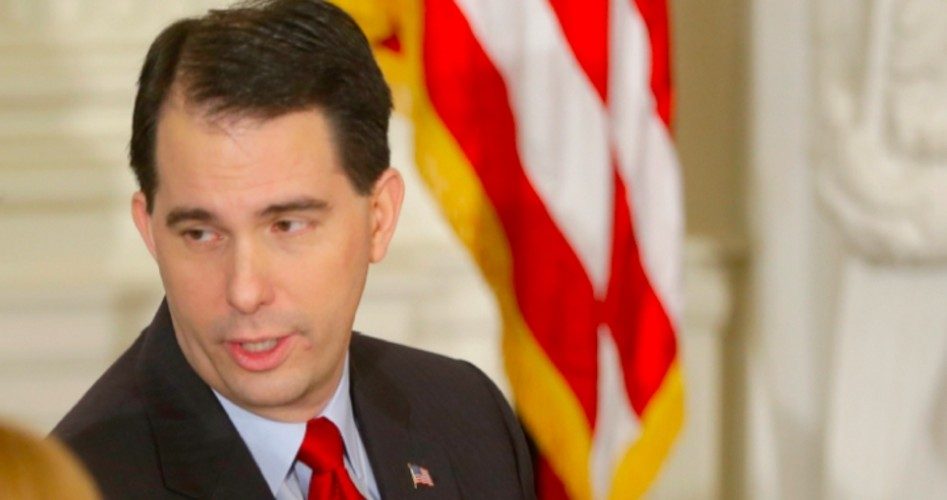
Republican governors once so ferocious in their fight against ObamaCare now seem content to roll over and play dead.
Perhaps their new agreeable attitude is inspired by the fact that President Obama was reelected in November while their own political futures remain in jeopardy. As the Associated Press reported last Sunday, “nearly two dozen GOP governors elected in 2009 and 2010 could face the voters again.”
The conciliatory spirit among the GOP executives was strong at the annual winter meeting of the National Governors Association held February 22-25 in Washington, D.C.
Wisconsin Governor Scott Walker (shown), once one of the most brazen bulldogs in the Republican kennel, reflects the new pragmatism prevalent among the GOP governors in comments he made at the governors meeting.
“People may agree or disagree with my position on this social issue or that social issue, but as long as I’m not rubbing it in their face all the time and instead talking about jobs and balancing the budget in a way that’s relevant to their lives, that’s where the real focal point is,” Walker said.
Walker knows firsthand how fragile the hold on office can be. Last year, Walker narrowly escaped a recall movement backed by unions.
“We’ve got to be relevant,” Walker added.
Relevant and repentant.
Nowhere is the governors’ go-along policy more evident than in the flip-flop on ObamaCare.
As the AP story explains, “Seven states led by Republican governors are pushing to expand their Medicaid program under Obama’s health care law. Such a move once was considered anathema in the party.”
The latest challenger converted to the cause of supporting ObamaCare is Florida Governor Rick Scott. Scott and the Florida attorney general once led the coterie of states challenging the constitutionality of the health care mandates, now, the governor considers the war lost.
Scott told his fellow governors at last week’s gathering that the Supreme Court’s ruling declaring ObamaCare constitutional makes the mandates “the law of the land.”
Despite the recent opinion of the Supreme Court upholding the constitutionality of ObamaCare, there is little debate as to whether the Constitution provides power to the federal government to require individuals to purchase qualifying healthcare plans or to force states to establish healthcare exchanges.
While many constitutionalists and Republicans took heart at the courage in the defiance of the various state executives, they are rightly dismayed at what they perceive as a betrayal of these governors’ oaths of office.
Governos Scott and Walker are but the latest bulldogs turned lapdogs. As we reported early February, the call to heel had already begun.
Governor John Kasich of Ohio, Governor Gary Herbert of Utah, and Governor Jan Brewer of Arizona all softened their formerly hardline in advance of the deadline to establish ObamaCare exchanges and just in time to assure their constituents that the federal checks will keep coming.
Regarding Brewer’s defection, MSNBC reported: “On Monday [January 14] Arizona’s Republican governor announced she would stop fighting Obamacare and actively embrace one of its key provisions: an expansion of Medicaid to cover citizens earning up to 133% of the federal poverty level ($26,344 for family of three last year).”
“Trust me,” Brewer added.
Thomas Jefferson (the father of nullification) had something to say about trusting politicians:
Free government is founded in jealousy, not confidence. It is jealousy and not confidence which prescribes limited constitutions, to bind those we are obliged to trust with power…. In questions of power, then, let no more be heard of confidence in men, but bind him down from mischief by the chains of the Constitution.
Not only are these governors losing the confidence of conservatives, but they are simultaneously loosening the chains of the Constitution that once bound the federal government.
And what of nullification? Why are these state executives so willing to surrender the sovereignty of their states? Political ambition, it seems, outweighs fidelity to oaths or adherence to principles of republican government and federalism.
State government action to stop ObamaCare at the border is a sound application of the constitutional principle of nullification.
Simply put, nullification is the recognition of the right of states to consider null, void, and of no legal effect any act of the federal government that exceeds the “few and defined” powers granted to it by the states in the Constitution.
Despite the spread of the capitulation fever, the battle against federal government’s mandates is not over. Citizens must keep tabs on their governors and watch for the first tell-tale signs of the spread of the surrender sickness spreading through the state houses.
There’s more than just electoral pragmatism at work, however. Governors know better than anyone that they rely on federal largesse for the bulk of their state budgets and would hardly be in their best (read: re-election) interest to bite the hand that feeds them.
For example, in Governor Walker’s home state of Wisconsin, nearly 33 percent of the state budget comes from Washington, D.C. In Florida, Governor Scott’s home state, almost 37 percent of the budget is contributed by the federal government. In Ohio, Governor Kasich cashes checks from Congress that account for just shy of 39 percent of the Buckeye State’s budget. Governor Herbert of Utah receives 31.5 percent of his state’s funds from the feds, while Governor Brewer’s state coffers are filled nearly 46 percent with federal money.
For many Republican state leaders anxious to continue occupying seats of power, it seems that money talks and freedom walks.
Sadly, it also seems that pragmatism rather than principle is the path being chosen by the Republican Party of 2013.
Photo of Wisconsin Governor Scott Walker: AP Images
Joe A. Wolverton, II, J.D. is a correspondent for The New American and travels frequently nationwide speaking on topics of nullification, the NDAA, and the surveillance state. He can be reached at [email protected].


